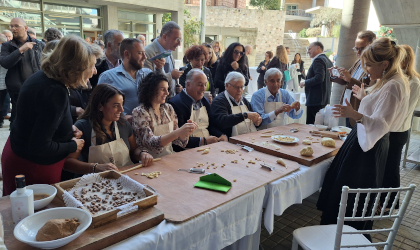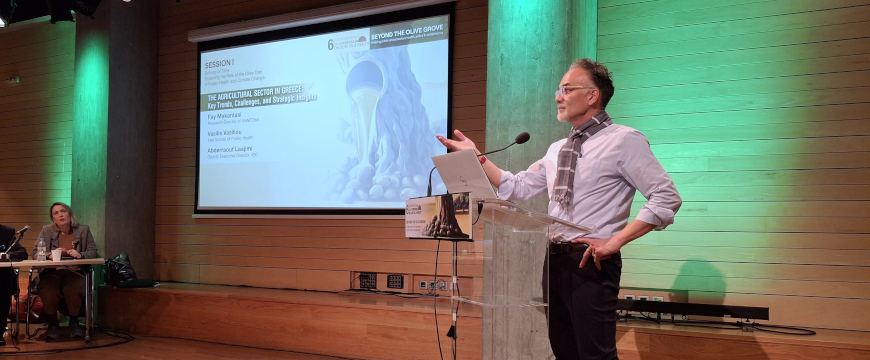Why does olive oil help combat climate change? How can soil affect human well-being? What does marketing have to do with public health? These were just a few of the many questions considered by almost 100 participants from 15 countries at the 6th International Yale Symposium on Olive Oil and Health in Heraklion, Crete, Greece at the beginning of December.
Organized by Dr. Vasilis Vasiliou and Dr. Tassos C. Kyriakides of Yale School of Public Health along with an international team of experts and assistants, the symposium explored health in the broadest sense of the word, and olive oil in the context of wellness, cuisine, marketing, climate change, and the environment. Vasiliou noted that as “a cornerstone of the Mediterranean diet” olive oil has been recognized for its health benefits in both ancient and modern medicine. Kyriakides pointed out that part of their goal is to “shift the paradigm from treatment to prevention. That’s what the Mediterranean diet and nutrition can give us, for a global movement.”
Early in the symposium, Vasiliou provided an overview of recent scientific evidence that olive oil helps with cardiometabolic health, neurodegenerative diseases, mental wellness, liver and kidney health, cancer prevention, skin and bone conditions, and autoimmune diseases. He pointed out that extra virgin olive oil helps reduce oxidative stress, inflammation, blood pressure, “bad” cholesterol, blood glucose, and insulin resistance, as well as increasing gut microbiota diversity and having anti-bacterial and probiotic effects.
At a symposium on “Olive Oil and Health,” such points were unsurprising. The same is true of the title of Dr. Harris Pastides’s keynote address: “What will it take for the olive to have a global impact on public health?” Yet presenters also ventured far beyond the most obvious subtopics, for example in International Olive Council Deputy Executive Director Abderraouf Laajimi’s points about olive cultivation as a strategy to combat climate change. It became evident that “health” referred to much more than an absence of human disease at this symposium.
It also became clear that the way academics, producers, and professionals communicate with consumers about the value of olive oil can make a big difference to human and environmental well-being, since people must be convinced to use olive oil in order for it to confer advantages. There was some debate about whether marketing should emphasize olive oil’s health benefits, its gastronomic versatility, or its contribution to the fight against global warming (since olive groves are a carbon sink full of trees able to withstand dry, barely fertile conditions). Some opted for all of the above.
With climate change on everyone’s mind, Dr. Vasileios Gkisakis described agroecological approaches to enhancing the sustainability and resilience of olive farming–approaches that consider food and agriculture systems from ecological and socioeconomic points of view. He then introduced the similar concept of One Health, which helps tie together the apparently disparate discussion threads of the symposium.
One Health was further defined by Dr. Camille Huser as “an integrated, unifying approach that aims to sustainably balance and optimize the health of people, animals and ecosystems.” Huser pointed out that One Health helps us understand that taking care of the soil in olive groves and farming olives sustainably helps improve the well-being of animals and humans. Huser also discussed the newer concept of planetary health, “the health of human civilizations and the natural systems on which they depend,” which does not consider animals but emphasizes the interrelations of people and their natural environment, and thus the importance of finding solutions for climate change.
Considering everything from the ground up, scientists at the symposium explained how such things as organic compost, cover crops, biological pest control, reduced use of chemical inputs, and carefully monitored water use can contribute to more sustainable, more productive olive cultivation, better products, and healthier people and animals, while adapting to and combating climate change. New and improved methods, strategies, and technologies were introduced.
Some of the most striking examples of a sustainable circular economy that eliminates or drastically reduces waste were described in three presentations. Antonis Tirpintiris explained how he and his team reclaimed barren desert land on the island of Lesvos by planting trees and plants, especially the olive trees that showed particular resilience there, using the latest technology to determine the precise amounts of inputs required. On their regenerative estate, they established Sigri Olive Mill and created their O’leve olive oil brand in the midst of “a fully functional, vivid ecosystem” with new biodiversity.
Christina Legaki, Dr.h.c. described an olive mill of the future which the PhenOlives company has made possible in the present. The mill includes patented machinery that enables the creation of valuable products in an “upcycling solution” for the 85% of the olive that used to be discarded as waste. Olive pulp is dried so it can be ground into nutritious gluten-free, high fiber flour for baking; pits are saved to become biofuel and construction materials; antioxidant phenolic compounds and squalene are extracted to be used in supplements; and water is cleaned for future use. This can be a win-win situation for the environment, producers who can earn more income, and consumers who can purchase wholesome new products.
For another win-win strategy, several scientists described their work on livestock feed that incorporates olive by-products (no longer “waste”) into the animals’ diet, with positive results for the animals, the farmers, and consumers. In a different approach to waste reduction, Nicolas Netien told the story of Kot-Kot, a vegan organic olive farm in Cyprus where hens too old to lay eggs in an industrial setting are adopted and allowed to roam among natural ground cover in the olive grove, with recovered food waste offered for additional nutrition. The retired hens fertilize the olive grove and help control pests there, providing an eco-friendly, cost-saving solution to problems of waste and excessive use of chemical inputs, thus contributing to the fight against climate change.
The symposium also featured discussions of olive oil authentication and analysis, as well as ways to use olives and olive oil both for gastronomic enjoyment and for nutrition. Mentioning public awareness of fraud, scientists presented several innovative methods and plans for olive oil authentication and traceability, as well as comparing methods for analyzing olive oil’s beneficial phenolic content. Researchers presented work on the impressive but under-appreciated health benefits of table olives (with 20-30 times more antioxidants than olive oil!), on functional foods made from olive paste, and on a food supplement created using phenolic compounds extracted from olive oil.

A pasta making workshop and an olive oil tasting session emphasized the interconnection of diet, culture, history, and daily life in the traditional Mediterranean diet and lifestyle. Surprisingly, the symposium included only passing references to the Planeterranean or Planetary diet that seeks to adapt a Mediterranean-style diet to fit the cultures, cuisines, and locally available food in different parts of the world, but more on this should come up at the 7th International Yale Symposium on Olive Oil and Health, which will take place next year in Brazil.
Overall, the symposium featured a program too wide-ranging, rich, and extensive to briefly summarize. (Fortunately, scientific conference proceedings will be published.) This interdisciplinary, inter-generational gathering included participants ranging from students to emeritus professors, from epidemiologists, biochemists, and medical doctors to agronomists and olive oil producers. The six international symposia in the Yale series seem to be taking steps toward the organizers’ ultimate goal of a much-needed Coordinating Center for Research on Olive Sciences that would foster collaboration and facilitate data sharing, communication, outreach, and policy advocacy internationally.
Abderraouf Laajimi of the International Olive Council praised the “convergence between science, industry, and international institutions” at the symposium. University of South Carolina president emeritus Harris Pastides commented that the symposium’s “combination of microscopic and planetary levels was excellent; they belong together; and our interdisciplinary coming together is the way to effect change.”
All businesses, organizations, and competitions involved with Greek olive oil, the Mediterranean diet, and/or agrotourism or food tourism in Greece, as well as others interested in supporting Greeks working in these sectors, are invited to consider the advertising opportunities on the Greek Liquid Gold: Authentic Extra Virgin Olive Oil website. The only wide-ranging English-language site focused on news and information from the Greek olive oil world, it has helped companies reach consumers in more than 220 countries around the globe.


